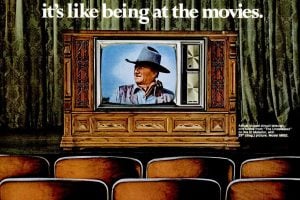Loretta Swit is a M*A*S*H star (1972)
By Charles Witbeck, Hollywood – Tallahassee Democrat (Florida) October 1, 1972
It’s hard to resist “M*A*S*H,” CBS’ sharp and goofy Sunday night comedy based on Bob Altman’s funny movie and Richard Hooker’s novel.
The new television cast of medical jokers pulling war duty in Korea during the ’50s doesn’t disgrade the original Elliott Gould – Donald Sutherland – Sally Kellerman crowd, and the half-hour TV format appears to be a suitable vehicle for the escapades of surgeons Hawkeye and Trapper John, attempting to maintain sanity in a senseless world.
IN THE HANDS OF Broadway writer Larry Gelbart, the sardonic material sounds fresh and relevant. So, the transfer from the big screen to the little one hasn’t hurt for once.
The series should enjoy a decent run. The winner of the race for a role in a potential smash like “M*A*S*H” is Loretta Swit, the Polish girl from Passaic, New Jersey, who snagged the Sally Kellerman movie role of the haughty, by-the-book chief nurse, Major Margaret (Hot Lips) Houlihan.

Loretta has a lucky Hollywood streak going, and playing the only female regular on the show, surrounded by five males, indicates Miss Swit can do no wrong just now.
The actress only arrived on the scene two years ago, fresh from runs in “Mame” as Agnes Gooch, and she quickly became a CBS favorite, working network bulwarks, “Mannix,” “Mission: Impossible,” “Hawaii Five-0,” “Gunsmoke,” and after the other, playing neurotics or heroines.
AS HOT LIPS, LORETTA makes no attempt to emulate Sally Kellerman’s willowy movie portrayal, and goes her own route, doggedly opposing insurgents Hawkeye and Trapper John, plaintively crying out to the brass, “Those two are ruining our war for us.”

Hot Lips’s steady is Major Frank Burns (played by Larry Linville), the straight-arrow exec officer, easily provoked by disrespectful surgeons. Representing the military establishment, Burns and Houlihan are the outraged patsies, and seldom win a round.
Aligned with Burns at the base camp, Houlihan also stabilizes her position by entertaining the brass. “I start at the top,” said Loretta Swit, describing Hot Lips’ conquests. “Three generals and a major lead the list.”
Loretta sees the show as a black comedy, illustrating how men who would normally never associate with each other are trapped in Army confines. The actress believes the TV series is closer to Hooker’s novel than Altman’s picture, and she’s happy to see much of the film’s surgical gore disappear. “I didn’t like all the blood in the movie,” she said. “I don’t think it’s necessary. The point was clear.”

Working in a hit with five men qualifies as Hollywood’s dream job of the season for an actress, and outgoing Loretta, known as Ma Swit on the set, is making the most of it. Timothy Brown (Spear-chucker) teaches the lady jogging, Wayne Rogers (Trapper John) explains the heady world of finances and business deals, and Alan Alda (Hawkeye) furnishes acting moves.
One learns that Ma Swit would rather talk about the fellows. “I have nothing colorful to say,” she said. “I play tennis, and I read a lot and look at old movies. My favorites are old Frankenstein pictures — the awful ones my brothers and I were never allowed to watch as kids. I also have a fascination for Africa. Got to get over there someday.”
EAGER TO KNOW WHAT’S going on, Loretta runs on overdoses of energy and then exhausts herself. After a brief refueling process, she’s revved up again, and bounces around. Loaded with zest, Loretta still puts herself down.
“You see,” she said, “I’m totally involved in acting. Nothing matters more than ‘M*A*S*H’ now. I just want to perform and learn. That’s not very interesting. Talk to the guys; they’re the ones with color.”
Loretta Swit: Passionate and positive (1973)
Norma Lee Browning – Chicago Tribune (Chicago, Illinois) July 8, 1973
Hot Lips — the officious, sterile combat nurse who is torn between her duties, which she takes very seriously, and her passion for Major Frank Burns (Larry Linville) on that funny, funny series called M*A*S*H.
Hot Lips is played by Loretta Swit, a tall, green-eyed, well-built blonde who really digs her role.
“Hot Lips is above all a career woman, and being head nurse is very important to her,” she says “But she’s also very insecure, and when she’s backed against the wall, she gets defensive and rattled. She’s a real female underneath that stuffy manner.”
No wonder Loretta feels in tune with her character. Though there’s nothing stuffy about her, she takes her job — acting — very seriously indeed.
“Ever since I can remember, I not only wanted to be an actress, but I also knew that I would be one. When I was a little girl, each time I went to bed at night, I created roles for myself and acted them out in my mind before going to sleep. I rehearsed and rehearsed all my fantasies until they were as real as my real life.”

Loretta Swit (of course that’s her real name, because nobody could invent a name like that) is the world’s greatest believer in the power of positive thinking and P.M.A. (that’s Positive Mental Attitude).
She firmly believes that you can will almost anything to happen if you work at it hard enough, and that her P.M.A. helped her to become an actress and, we kid you not, a good tennis player.
“I rehearsed my grip, my swing, and my stance in my mind and it really helped,” she says firmly.
Loretta also secretly hopes that there is such a thing as reincarnation (“I would like to return as a bird or a flower”). She’s a dog nut, and recently bred one of her two grown Pekingnese to a Poodle (“So I now also have two Pekapoos”). And she has just finished writing a children’s book, complete with her own illustrations (“I didn’t do it for money, but for fun”).
M*A*S*H has been way up high in the ratings and goes into its second season in the fall. With all that P.M.A. Loretta Swit has going, it will probably remain on the air forever.
Loretta Swit interview: Look what happened to the ‘ugly’ kid (1976)
Bernard Gavrer – The Shreveport Journal (Louisiana) January 23, 1976
Once upon a time, there was this really ugly kid —not just ugly, but uuhhgggl-ly — all blonde hair and pug nose and lantern jaw and braces bracketed by fat lips who was born in Passaic, N.J., no less, and whose granny would touch her on the head and say, “Duzo roszni!”
WHICH, AS any Polish person would know, means: “Grow tall!” And when she did, she was 5’6″ and her name was Loretta Jane Swit, but she was no longer an ugly duckling. Instead, she was sexy enough and blonde enough and oomphy-dump enough to be the guileful, predatory Major Margaret “Hot Lips” Houlihan of M*A*S*H. Which she still is.

She has also stepped admirably into the role of Doris, in the two-character Broadway comedy hit, “Same Time Next Year.” Prospects are that she’ll remain in the show until the call comes to do 1976-77 season segments of M*A*S*H.
THE MEMORY of her grandmother’s benediction came like a flashback as she spoke recently of what had placed her on the headlong path to the theater. “Every time she saw me, my grandmother on my mother’s side would touch me and say, ‘Duzo roszni.’ know that it literally means, ‘Grow tall.’ But it means much more. It means ‘sprout’ — ‘fly.’ I took it for granted,” she said.
Perhaps the moment of realization, or fulfillment, came when she packed her bags and said, goodbye Passaic, hello New York, which was shortly after graduation from Pope Pius High and sometime before taking drama courses with Gene Frankel and her first chance on stage as understudy for the key role in “Any Wednesday.”
AND WHEN interviewers ask her what was her first break, her standard reply is: “Leaving Passaic.”
But it’s not as though Loretta has any umbrage for the town or its folks. “My family just didn’t understand me,” she said. “There’s nothing that would have made them so happy as for me to get married, have a flock of kids and live a block away. That would still make them happy.”
There appears little prospect of Ms. Swit becoming Mrs. anything, she says, because right now there isn’t anybody who comes within two light years of being the right Mr. “I don’t want to talk about that,” she said, “that” being any part of her romance, past or present.

BESIDES SEX, she doesn’t like to talk about politics or a long litany of insecurities she possesses. Although on stage or in TV she seems strongly in command, she confesses to a vulnerability that is almost frightening. “I guess I tend to hide,” she said.
Indeed, meeting the press she said, is always an ordeal. “It’s a great struggle for me to assume that anyone is really interested in me personally. I worry that I will say things that I know aren’t clever or witty or interesting. “Maybe that comes out of my family life — out of parents who told me that anytime you begin a sentence with ‘I,’ you are boring,” she said.
HER FAMILY came to see her in the role created by award-winning Ellen Burstyn, and later, backstage, her mother complimented her, saying, “It’s nice. You make people laugh.”
“Now I think I have a great sense of humor,” she said. As she did. that tone of self-doubt and instability vanished. Whenever she talks about acting or her passionate affair with the theater, she suddenly lands on very firm ground.
“People I work with tell me that. But they don’t have to. I know I do because I like to laugh and I do laugh,” she said. And as she talked it became clear that her comedic sense ranges from an appreciation of bad one-line gags to a subtle — and very cerebral — wit.

SOME OF that emerged as she talked of the value of having been “funny-looking,” as she put it, or of not being sensationally beautiful, in the manner of, say, Catherine Deneuve.
Like most aspiring actors and actresses, Loretta assumed that one requirement for success was possessing looks that could set folks off ahhing and oohing.
“I grew up wanting very much to be beautiful,” she said. “But I discovered that the meaty roles go to the unclassical-looking people. If I’d looked like Catherine Deneuve, I couldn’t ever have done Gooch.”
Gooch was the Agnes Gooch of “Mame,” a juicy, sought-after role that spelled instant attention, and Loretta played it in the national company of the play.
Through it all, they age. And so the audience sees a kaleidoscope of changing fashion in dress and furnishing and manner in the 24 years through the decades of the 1950s, 1960s and into the 1970s.
MORE LORETTA: Cagney and Lacey: A police partnership that broke the mold & redefined TV friendships for women
There are births, deaths, kids off to school, kids and the tooth fairy, and through it all there runs the recognizable thread of real people having lived through a real period. And in the hands of Loretta Swit and Ted Bessell, there is much pleasure and laughter in those years. It is a thoroughly delightful comedy.
“DOING THOSE roles (Gooch, “Hot Lips” Houlihan, Doris), made me understand that classical beauty is a handicap,” she said. “I am still the same me I was as a child; the same too-much hair and pug-nose and jaw and what you call ‘generous’ lips. But that is what is me.”

Loretta may be no classical beauty, but she is a person of appetizing demeanor, agreeable and pleasant, warm and friendly and very nice to behold. “Hot Lips” made hers an easily recognizable face, and that has brought some understandable misery to her.
“I can’t go anywhere I want because in public, you don’t have your own life.” she said. “I know it is odd to complain, and it is true that it is lovely that people feel that way about you, as though they know you.”
HER LATEST coup, landing the role of Doris in the Broadway hit “Same Time Next Year,” is an exquisite one for any comedic talent. Unlike the broad comedy inherent in playing Gooch, or the slightly slapstick zaniness of “Hot Lips” Houlihan, Doris’ charm and power lies in the heart of the play, in the script.
In the play, she and her lover, George (played by Ted Bessell), are on stage throughout the play. No other actors appear. The story is that of two rather middle class, average, essentially decent human beings, who happen to find themselves entangled in a romantic episode while away from their respective spouses.
They find something different in one another, but the magnetism of it is not strong enough to pull them together and pull apart their marriages. It is strong enough for them to meet again the following year, while he ostensibly is attending to income tax work for an old-time buddy and she ostensibly is attending a retreat. And they meet the next year and the next and the next. And never for more than for a brief, few days together.

THAT’S THE major peculiarity of being a TV personality, she says — the fact that the viewer feels an intimacy with the figures he views on screen. One thing she resents about being a celebrity, however, is the ripoff.
She has an ivy-covered house in California (“Like I’ve got hair, the house has ivy”) and had to deal with some workmen. “When a workman comes to estimate the job and sees who it is, the price goes up three times,” she said. “I don’t like that at all.”
Loretta’s tendency to want to hide suggests that she is introverted, or even lonely. “That’s not so,” she said. “Being alone doesn’t mean that I’m lonely. I’m not. I’m a great collector.”
THE PECULIAR object of her collection is rabbits. Silver rabbits, porcelain rabbits, silk rabbits, bronze, clay who “live,” she said, on a Queen Anne lowboy in her house in Los Angeles. It’s a house that has a collection of 18th century English furniture and Oriental rugs and plants of every description, all under the watchful eyes of what she calls “a herd of dogs.”
Her plants thrive, although she does not carry on conversations with them or play special music. But she does have a plant communicator. “You stick it into the earth around the plant and it tells you with a tone how much water it needs,” she said.

ONE OF HER principal hobbies is typical of loners: She likes working with watercolors.
But what matters most, what holds absolute priority over everything and anything else, is work. Acting is more than a profession or lifestyle or mission, she said. “Give me a script I can hide behind, and I’m really secure. If I have to make a speech, I’m a quivering mess. But give me a character to be, ANY character, and I’m confident, secure.
“Whatever it is that that character must be, do or say, I can be, do or say because, after all, it isn’t really me doing it or saying it or being it. It is the character.”
As far as her Polish ancestry goes, Loretta Swit may not have attained the stature of a national hero such as Gen. Casimir Pulaski or had a highway named after her, but folks in Passaic and in Chicago area Polish strongholds could celebrate her with some of the respect accorded to Lawrence Welk.
Does she feel any ethnic pride in her family origins? Would she, for instance, lose her sense of humor when it comes to Polish Jokes?

“I’M NOT uptight about that,” she said, “If it’s funny, I laugh. If not, no laugh.” She made a “Hot Lips” Houlihan kind of smile as though revealing a secret: Loretta Jane Swit is the best Polish joke around.




















